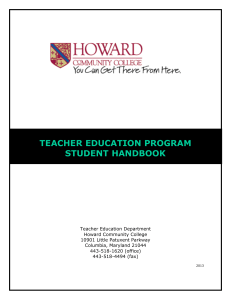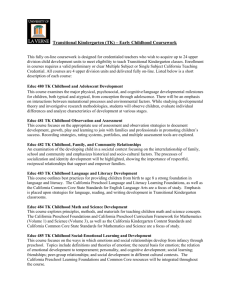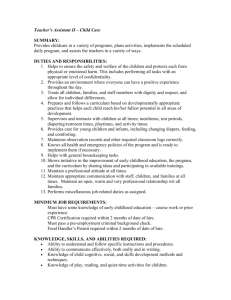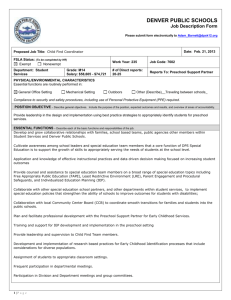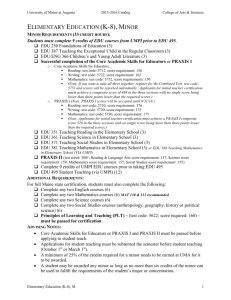teacher education program - Howard Community College
advertisement
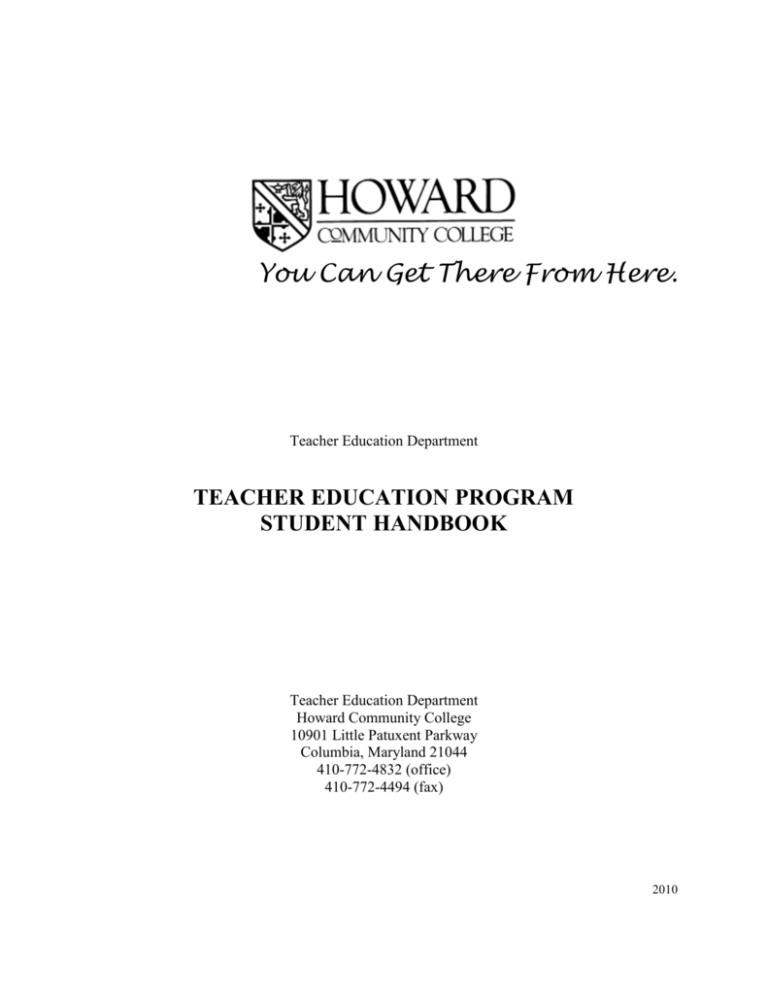
You Can Get There From Here. Teacher Education Department TEACHER EDUCATION PROGRAM STUDENT HANDBOOK Teacher Education Department Howard Community College 10901 Little Patuxent Parkway Columbia, Maryland 21044 410-772-4832 (office) 410-772-4494 (fax) 2010 Table of Contents Mission Statement..........................................................................................……………….……….… 1 Faculty and College Resources……………………………………………………………….…….….. 2 Yearly Events …………………………………………………………….….………………...…..…… 3 Program Overview Associate of Arts in Teaching (AAT)……………..…...…….….……………………..…….... 4 Associate of Arts (AA) ………………………………………………………….….…….…… 4 Professional Education Courses for Maryland Certification ………………………………… 5 (for those who already have a Bachelor’s Degree) Program of Study………………………………………………………………………………………. 6 Education Course Descriptions……………………….................................………………………...... 7 Field Experience………………………………………………………………………................……. 12 Basic Skills Tests …………………………………………………………………………….……….. 13 Teacher Education Performance Standards: INTASC Principles ……………………………..……… 14 The Professional Teaching Portfolio.............................................…….....…………..................…….. 15 Advising/Graduation Petitions ……………………………………………………………….………. 16 Welcome to the Teacher Education program at Howard Community College. This handbook has been prepared to assist you in attaining your goal of becoming a teacher. Mission Statement Howard Community College creates an environment that inspires learning and the lifelong pursuit of personal and professional goals. The college provides open access and innovative learning systems to respond to the ever-changing needs and interests of a diverse and dynamic community. As a vital partner, HCC is a major force in the intellectual, cultural and economic life of its community. 1 Faculty and College Resources Full-Time Faculty Fran Kroll, Director of Teacher Education and Early Childhood Development Praxis I Administrator Email: FKroll@howardcc.edu Office: ST-127 Phone: 410-772-4854 Kate Kenney, Assistant Professor, Early Childhood Development Program Email: KKenney@howardcc.edu Office: ST-157 Phone: 410-772-4059 Barbara Maestas, Assistant Professor, Elementary Education Email: BMaestas@howardcc.edu Office: ST-141 Phone: 410-772-4457 College Resources Social Sciences Division Office Advising: Jane Scott Fran Kroll, Director of Teacher Education Records and Registration Scholarship and Student Financial Aid Bookstore Library Services for Students with Disabilities 410-772-4832 410-772-4505 410-772-4854 410-772-4764 410-772-4912 410-772-4816 410-772-4922 410-772-4606 2 Yearly Events Teacher Education Fair (Fall only) This event provides students with the opportunity to meet with representatives from four-year institutions with Teacher Education programs. This recruitment event includes in-state and outof-state colleges and universities and is only for teacher education majors. Praxis I Information Session (Fall and Spring) This session provides an overview of this teacher licensure exam, which is required of all teacher education majors. Important information about test administration, registration, and preparation is reviewed. Teacher Education Information Session (Fall and Spring) This session provides detailed information of the teacher education programs offered at Howard Community College. Information about each program, advising, and the transfer process are the focus of this session. 3 Overview of Programs NOTE: Requirements in some/all programs may change due to possible new initiatives in the state. Associate of Arts in Teaching (AAT) This transfer program prepares students to transfer to a four-year college or university in the state of Maryland. The Associate of Arts in Teaching (AAT) degree has been articulated with all of the transfer programs in the state of Maryland. Students who receive the A.A.T. degree must have a cumulative G.P.A. of 2.75 and pass a required basic skills test*. Upon completion of the A.A.T. degree, students are eligible to be admitted to their major at their Maryland transfer institution. The Associate of Arts in Teaching (AAT) degree is not a guarantee of admission but rather an assurance of eligibility. Students may be required to take additional courses as part of the requirements for a baccalaureate degree and teacher certification at four-year institutions. Associate of Arts (AA) This program is designed for students who are interested in transferring to a Teacher Education program at a four-year college of university outside of Maryland as well as students who are not eligible to complete the requirements of the A.A.T. degree. While this program is designed to prepare students to pursue a bachelor’s degree program at the college or university level, students are advised to check the requirements of the institution to which they intend to transfer. Education requirements vary among transfer institutions and are currently being evaluated. It is essential to meet with an advisor regularly to be aware of program and certification changes. NOTE: Students in a Teacher Education Transfer Program must submit scores from a required basic skills test to the Social Sciences Division prior to the completion of the 30th credit hour. Scores from the basic skills tests are used for admission to four-year Teacher Education programs and are required for teacher certification in Maryland and most other states. Basic skills test options and Maryland passing scores are: *Praxis I – 177 in Math, 177 in Reading, 173 in Writing or a total composite score of 527 OR *SAT – composite score of 1100 in Math and Verbal (prior to 4/95, the SAT score equivalent is 1000) OR *ACT – composite score of 24 OR *GRE – composite score of 1000 A Teacher Education Information Session is held in the fall and spring semester. 4 Professional Education Courses for Maryland Certification This course of study is designed for persons who already have a Bachelor’s Degree and wish to become a certified teacher in Maryland. Students may enroll in teacher certification courses, including required coursework in English, math, science and social sciences, at HCC. However, students should have their academic credentials evaluated by the Maryland State Department of Education, Division of Certification to determine the requirements needed for certification. To request a transcript analysis by mail, submit the following: Qualifying scores on the Praxis I assessments. Additional tests, Praxis II, may be required for full professional certification but are not needed for an initial evaluation. A photocopy of the score report is acceptable; Official transcript(s) in an unopened mailer for all course work taken (community college, baccalaureate, post-baccalaureate, if applicable). Your transcript must show the degree and date of conferral. Student copies in an unopened mailer are also acceptable. (Do not have the college/university send transcripts directly to us.); and A cover letter with your name, complete mailing address, social security number, and the area of certification for which you are seeking an evaluation. Day time telephone number and personal e-mail address are encouraged. You may request only two evaluations per year. Send the complete packet to the following address: Maryland State Department of Education Certification Branch 200 W. Baltimore Street Baltimore, MD 21201 To learn more about transcript evaluation contact MSDE by logging on to www.marylandpublicschools.org or by calling the MSDE Certification Assistance line at 41— 767-0412. 5 Programs of Study* Early Childhood Education (AA): program # 130 Early Childhood Education/Early Childhood Special Education (AAT): program # 254 Elementary Education (AA): program # 131 Elementary Education/Elementary Special Education (AAT): program # 255 Secondary Education (AA) Humanities: program # 35a Social Sciences: program # 35b Math/Science: program # 35c Secondary Education (AAT): Chemistry: program # 207 Secondary Education (AAT): English: program # 247 Secondary Education (AAT): Mathematics: program # 208 Secondary Education (AAT): Physics: program # 209 Secondary Education (AAT): Spanish: program # 210 Professional Education Courses for Maryland Certification: program # 137 Early Childhood Certification (PreK-3) Elementary (1-6) and Middle School (4-9) Certification Academic Subjects (N – 12) and (7 – 12) Certification Generic Special Education: Infant/Primary (Birth – Grade 3) Certification Generic Special Education: Elementary/Middle (Grades 1-8) Certification Generic Special Education: Secondary/Adult (Grades 6 – 12) Certification * For detailed program planning sheets, log onto the Teacher Education website: www.howardcc.edu/teachereducation.html 6 Education Course Descriptions* EDUC 110: Introduction to Education (Elementary, Secondary) EDUC 111: Child Growth and Development (Early Childhood, Elementary, Teacher Certification: Early Childhood/Elementary, Generic Special Education: Infant/Primary, Elementary/Middle) EDUC 112: Methods and Materials in Early Childhood Education (AAT: Early Childhood; Teacher Certification: Early Childhood) EDUC 130: Introduction to Early Childhood Education (AA/AAT: Early Childhood) EDUC 200: Introduction to Special Education (AA/AAT: Early Childhood, Elementary, Secondary, Teacher Certification: Early Childhood, Elementary, Generic Special Education) EDUC 201: Processes and Acquisition of Reading (AA/AAT: Early Childhood, Elementary, Teacher Certification: Early Childhood, Elementary) EDUC 260: Educational Psychology (AA/AAT: Early Childhood, Elementary, Secondary, Teacher Certification: Early Childhood, Elementary, Generic Special Education) NOTE: Please refer to the appropriate program of study for the general education courses that are required for your major. *For detailed course descriptions, log onto the Teacher Education website: www.howardcc.edu/teachereducation.html 7 Teacher Certification Only EDUC 202: Methods for Teaching Reading in the Secondary Content Areas, Part I (Secondary, Generic Special Education: Secondary/Adult) EDUC 203: Instruction of Reading (Early Childhood, Elementary) EDUC 204: Assessment for Reading Instruction (Early Childhood, Elementary) EDUC 205: Materials for Teaching Reading (Early Childhood, Elementary) EDUC 206: Methods of Teaching Reading in the Secondary Content Areas, Part II (Secondary, Generic Special Education Secondary/Adult) EDUC 265: Educational Assessment (Early Childhood, Elementary, Secondary/Assessment of Students, and Generic Special Education: Infant/Primary, Elementary/Middle, Secondary/Adult) EDUC 266: Methods of Teaching Elementary Education (Elementary) EDUC 267: Methods of Teaching Secondary Education (Secondary) EDUC 290: Special Education General Methods (Birth – 12th grade) (Generic Special Education: Infant/Primary, Elementary/Middle, Secondary/Adult) EDUC 291: Special Education Methods (Birth – 8th grade) (Generic Special Education: Infant/Primary, Elementary/Middle School) EDUC 292: Special Education Methods (6th – 12th grade) (Generic Special Education Secondary/Adult) EDUC 293: Special Education Assessment Part I (Birth – 12th grade) (Generic Special Education Infant/Primary, Elementary/Middle School, Secondary/Adult) EDUC 294: Special Education Assessment Part II (Birth – 12th grade) (Generic Special Education Infant/Primary, Elementary/Middle School, Secondary/Adult) NOTE: Students taking teacher certification courses should have their academic credentials evaluated by the Maryland State Department of Education, Division of Certification, to determine coursework that may be required in English, math, science and social sciences. 8 Field Experience Integrated field experiences provide the student with an opportunity to strengthen the knowledge, skills, attitudes, and dispositions that are embedded in the integrated themes of the Associate of Arts in Teaching (AAT) program. This requirement is satisfied by meaningful time spent in classrooms for each education course. The field experience allows the student to observe a variety of learner characteristics and teaching practices. Each of the field experiences will contribute to the understanding and/or attainment of national teacher education performance standards, the INTASC principles. Goals As a result of the field experiences, the student will Gain further understanding of the characteristics of learners. Gain an understanding of the many tasks involved in teaching. Relate course work to actual classroom situations. Students complete 15 hours of field experience as a requirement for each education course (EDUC 110, EDUC 111, EDUC 130, EDUC 200, EDUC 260). The hours will be spent in observation and/or participation in order to complete assignments for each course. Completion of the field experience hours and the course assignments are requirements for successful completion of the AAT program. Students are required to meet basic expectations of professionalism during their field experiences. Please refer to the Field Experience Handbook for more in-depth information about the policies and procedures for field experiences. 9 Basic Skills Tests for Educators The Maryland State Department of Education requires all beginning teachers in all content areas to pass Praxis I if they have not previously passed a basic skills test*. Most 4-year colleges require students to submit documentation that the Basic Skills Test requirement has been met before admission to a Teacher Education Program. Associate of Arts in Teaching majors must meet this requirement to receive their degree. Also, students who already have a bachelor’s degree and are working on initial certification from MSDE, those seeking certification by creditcount, and conditionally certified teachers need to meet this requirement. * Basic skills test options and Maryland passing scores are: Praxis I: 177 in Math, 177 in Reading, 173 in Writing or a total composite score of 527 – OR SAT: composite score of 1100 in Math and Verbal (prior to 4/95, the SAT score equivalent is 1000) – OR ACT: composite score of 24 – OR – GRE: composite score of 1000 HCC offers two review classes. EDUC 101: Praxis Review Course Reading/Writing Tests (1 credit) EDUC 102: Praxis Review Course Math Test (1 credit) Praxis I Review books are available for purchase at the HCC bookstore. Practice tests are also on reserve in the library under the names Kroll/Lyons. More information is available. www.ets.org/praxis Contact your advisor or e-mail (transfer@howardcc.edu/advising) Visit the college website at www.howardcc.edu/transfer Call 410-772-4266 for more information For those taking Praxis I, you are best prepared to take the Reading and Writing tests after you have completed English 121. You are best prepared to take the Math test after you have completed MATH 127 or MATH 131. Students in the Teacher Education Transfer Program are required to submit official passing scores from Praxis I or SAT or ACT or GRE to the Social Sciences Division Office prior to the completion of the 30th credit hour. Additionally, scores must be submitted in a sealed envelope to the Admissions and Advising office. A Praxis I information session is held in the fall and spring semester. 10 INTASC Principles (Interstate New Teachers Assessment and Support Consortium) Principle 1: knowledge of content; making content meaningful The teacher understands the central concepts, tools of inquiry, and structures of the discipline(s) he/she teaches and can create learning experiences that make these aspects of subject matter meaningful for students. Principle 2: child development and learning theory; understanding developmental and age appropriateness The teacher understands how children learn and develop and can provide learning opportunities that support their intellectual, social, and personal development. Principle 3: learner diversity The teacher understands how students differ in their approaches to learning and creates instructional opportunities that are adapted to diverse learners. Principle 4: variety of instructional strategies; higher order thinking skills including problem solving and critical thinking The teacher understands and uses a variety of instructional strategies to encourage students’ development of critical thinking, problem solving, and performance skills. Principle 5: motivation and behavior; classroom management The teacher uses an understanding of individual and group motivation and behavior to create a learning environment that encourages positive social interactions, active engagement in learning, and selfmotivation. Principle 6: communication; technology; questioning strategies The teacher uses knowledge of effective verbal, non-verbal, and media communication techniques to foster active inquiry, collaboration, and supportive interaction in the classroom. Principle 7: planning for instruction; adapting instruction to the specific classroom situation The teacher plans instruction based upon knowledge of subject matter, students, the community, and curriculum goals. Principle 8: assessment The teacher understands and uses formal and informal assessment strategies to evaluate and ensure the continuous intellectual, social, and physical development of the learner. Principle 9: professional growth and reflection The teacher is a reflective practitioner who continually evaluates the effects of his/her choices and actions on others (students, parents, and other professionals in the learning community) and who actively seeks out opportunities to grow professionally. Principle 10: interactions with school colleagues, parents, and external agencies The teacher fosters relationships with school colleagues, parents, and agencies in the larger community to support students’ learning and well being. 11 The Professional Teaching Portfolio Recent emphasis in the restructuring of schools has highlighted not only changes in instruction but also changes in the ways teachers assess their instruction. One form of authentic assessment that is utilized to document professional growth and development is a portfolio. All Howard Community College students enrolled in teacher education programs will be provided with the opportunity to experience portfolio development in a manner that is similar to that which is used by many school districts. The portfolio is a representative compilation of evidence that documents the individual’s efforts, progress, and achievement as a pre-service teacher. The portfolio development process involves collecting, selecting, and reflecting on the items contained in the portfolio as they relate to the individual’s ability to meet performance standards, the INTASC principles. The portfolio should reflect individual growth and development throughout the program. Evidence of knowledge, skills, and abilities should be documented in a variety of ways. 12 Advising Students are strongly encouraged to see an advisor each semester prior to registering. Learning Programs may change from one catalog year to another. Students must follow the requirements of the catalog year in which they started their learning program. If you have any questions regarding your catalog year please see an academic advisor. Graduation Petitions Students who anticipate completing the requirements for an AA or AAT degree are responsible for filing a graduation petition with the Office of Records and Registration and for paying the graduation fee. The petition includes a review of the student’s completion of degree requirements. Therefore the petition must be signed by an advisor. The deadlines for submitting graduation petitions are May graduation March 15 Summer I graduation April 15 Summer 2 graduation May 15 December graduation October 15 Students who do not complete degree requirements in the semester in which they first applied for graduation may petition for graduation at a later date. Articulated Credits from Howard County Public School System Howard Community College and the Howard County Public School System have collaborated to offer some education courses taken in high school and applied after high school graduation toward an education degree or certificate program offered by Howard Community College. If you have completed the required course(s), which are described on the following pages, and achieved a grade of B or higher in these course(s), you are eligible to receive up to 6 college credits to be applied to an education degree or certificate program at Howard Community College. This is done once you have been accepted to HCC and declared the appropriate education major. These credits satisfy some of the required courses in the specific education program. If you believe you are eligible for articulated credit, please contact the HCC Admissions and Advising Office at 410-772-4856. 13

